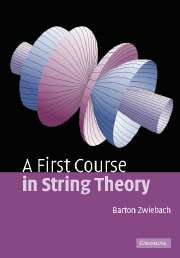Book contents
- Frontmatter
- Contents
- Foreword
- Preface
- Acknowledgements
- Part I Basics
- Part II Developments
- 14 D-branes and gauge fields
- 15 String charge, electric charge, and particle physics
- 16 String thermodynamics and black holes
- 17 T-duality of closed strings
- 18 T-duality of open strings
- 19 Electromagnetic fields on D-branes
- 20 Nonlinear and Born–Infeld electrodynamics
- 21 Covariant string quantization
- 22 String interactions and Riemann surfaces
- 23 Loop amplitudes in string theory
- References
- Index
16 - String thermodynamics and black holes
from Part II - Developments
- Frontmatter
- Contents
- Foreword
- Preface
- Acknowledgements
- Part I Basics
- Part II Developments
- 14 D-branes and gauge fields
- 15 String charge, electric charge, and particle physics
- 16 String thermodynamics and black holes
- 17 T-duality of closed strings
- 18 T-duality of open strings
- 19 Electromagnetic fields on D-branes
- 20 Nonlinear and Born–Infeld electrodynamics
- 21 Covariant string quantization
- 22 String interactions and Riemann surfaces
- 23 Loop amplitudes in string theory
- References
- Index
Summary
The thermodynamics of strings is governed largely by the exponential growth of the number of quantum states accessible to a string, as a function of its energy. We estimate such growth rates by counting the number of partitions of large integers. The behavior of the entropy indicates that at high energies the temperature approaches a finite constant, the Hagedorn temperature. The finite temperature single-string partition function for open bosonic strings is calculated. We explain how the counting of string states can be used to give a statistical mechanics derivation of the entropy of black holes. The calculations give results in qualitative agreement with the entropy of Schwarzschild black holes and in quantitative agreement with the entropy of certain charged black holes. We discuss the AdS/CFT correspondence, which states that a certain four-dimensional field theory is fully described by closed superstrings that propagate on a curved spacetime.
A review of statistical mechanics
Our study of string thermodynamics will make use of both the microcanonical and canonical ensembles. Recall that the microcanonical ensemble consists of a collection of copies of a particular system A, one for each state accessible to A at a particular fixed energy E. In the canonical ensemble we consider the system A in thermal contact with a reservoir at a temperature T. This ensemble contains copies of the system A together with the reservoir, one copy for each allowed state of the combined system.
- Type
- Chapter
- Information
- A First Course in String Theory , pp. 352 - 385Publisher: Cambridge University PressPrint publication year: 2004



